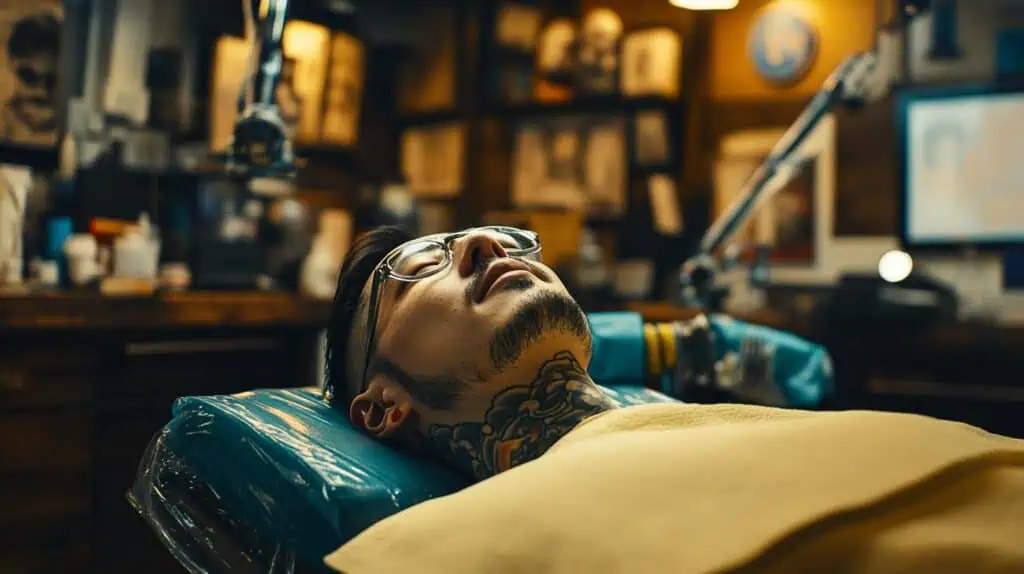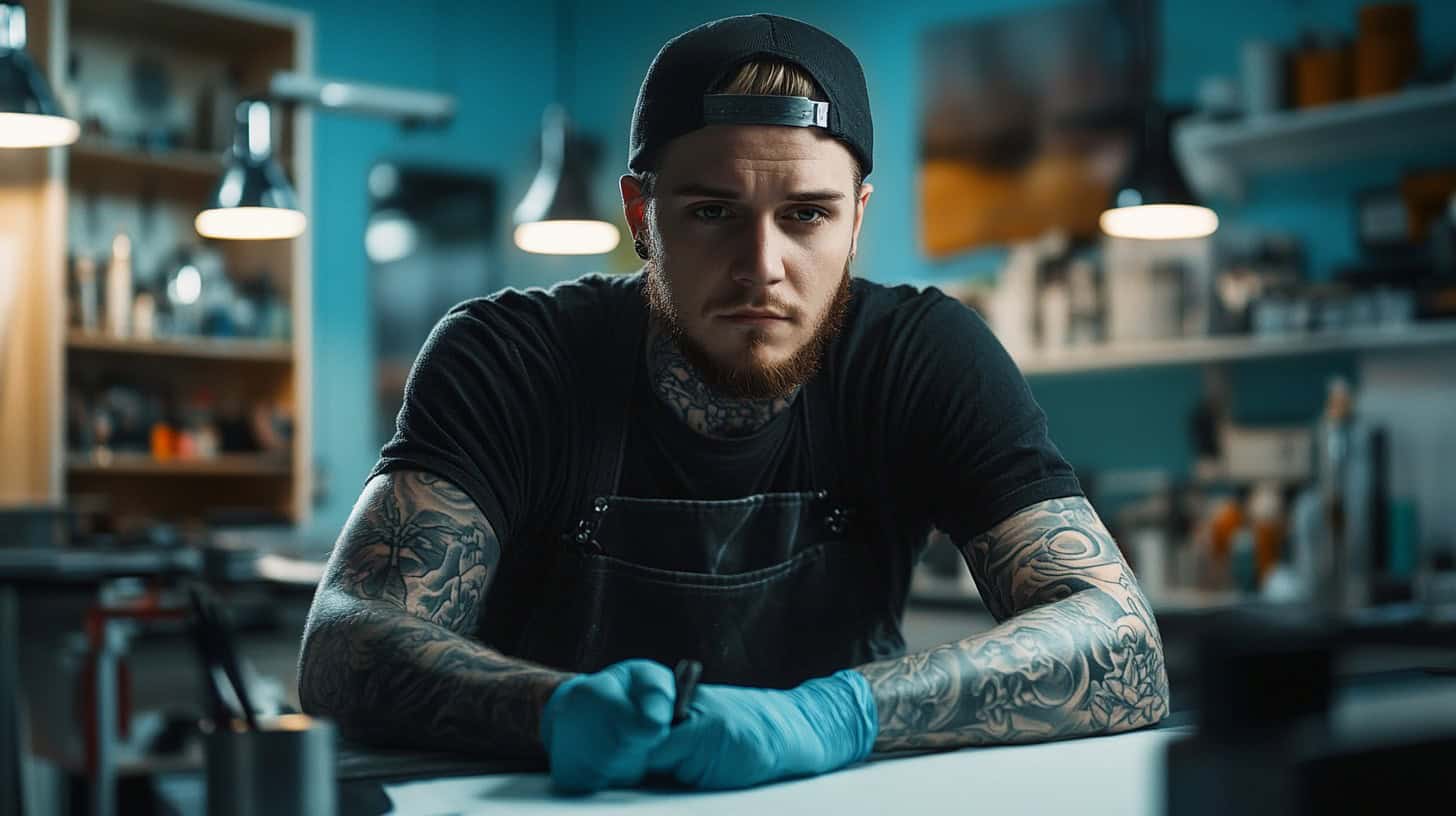Thinking about inking? You might be wondering if you need a license to tattoo legally. It’s not just about wielding a needle – there’s more to it. In the US, most states require tattoo artists to have proper licensing. 2
This article will walk you through the four key steps to becoming a legit tattooer. 1 Ready to get the lowdown on legal inking? 3
Key Takeaways
Most U.S. states require tattoo artists to have a license. Rules vary by location.
To get licensed, artists need training in bloodborne pathogens, infection control, and first aid. Some programs have 500 video lessons on tattoo techniques.
The license application process involves paperwork, fees (up to $500 in some places), and often an exam. Licenses usually need renewal every 1-2 years.
Tattoo shops must follow strict health and safety rules. This includes proper hand washing, glove use, tool sterilization, and waste disposal.
In all 50 states, people under 18 need parental consent for tattoos. Parents may need to provide proof of identity and relationship.
Table of Contents
Tattoo Licensing Requirements

Tattoo licensing isn’t a one-size-fits-all deal. Rules change from place to place – what flies in New York might not cut it in California. It’s a mix of local laws, health codes, and sometimes even zoning rules that decide if you need a license to ink.
Regional and International Licensing Criteria
Tattoo licensing rules vary widely across regions and countries. In the U.S., each state sets its own standards. Florida, for example, requires all tattoo artists to get a license.
They even make guest artists pay $35 for a two-week permit. 2 Philadelphia takes it up a notch. Artists there need blood safety training and three years of full-time work experience.
It’s not just about skill – it’s about keeping folks safe.
Internationally, the rules can be just as diverse. Some countries have strict national laws, while others leave it up to local authorities. In many places, you’ll need to prove you know how to prevent infections and handle emergencies. 1 Health departments often inspect studios regularly. They check everything from cleanliness to proper needle disposal. Next up, let’s look at the specific rules for tattoo and piercing shops.
Specific Regulations for Tattoo and Body Piercing Studios
Tattoo and body piercing studios must follow strict rules. They need to keep records of all their work. This includes details about each tattoo or piercing they do. Studios also have to use universal precautions.
These are steps that help stop the spread of germs. For example, artists must wash their hands with special soap. They also need to wear clean clothes and new gloves for each client. 4
Proper cleanup is a big deal in these studios. They must throw away used needles in special containers. All tools must be sterilized, and records kept of this process. It’s not just about being clean – it’s the law.
Breaking these rules can lead to big fines or even shutting down the shop. Health inspectors check studios to make sure they’re following all these rules. This helps keep everyone safe, whether you’re getting simple tattoo ideas or complex body art. 3
How to Obtain a Tattoo License

Getting a tattoo license isn’t just a walk in the park. You’ll need to roll up your sleeves and dive into some serious training – think bloodborne pathogens, infection control, and first aid.
Training and Certifications Needed
Tattoo artists need serious training before they can start inking. It’s not just about drawing cool designs. You gotta learn how to keep things clean and safe. Most places want you to know about sterilization, first aid, and CPR.
You’ll also need to learn about bloodborne pathogens – that’s the scary stuff in blood that can make people sick. 5
Training programs can be pretty intense. Some have 500 video lessons just on tattooing techniques! You’ll learn how to handle needles safely and clean your gear properly. Many places also want you to get a Hepatitis B shot.
It’s all about keeping you and your clients healthy. After all, nobody wants to catch something nasty from a tattoo session. 6
Application Process and Fees
Now that you’ve got the right training, it’s time to tackle the paperwork. Let’s break down the application process and fees for getting your tattoo license.
- Fill out the tattoo artist license application. Each state has its own form, so check with your local health department. 6
- Gather two forms of ID. You’ll need a government-issued photo ID, like a driver’s license, plus another form of identification.
- Get your bloodborne pathogens certification. Take an approved training program and include the cert with your application.
- Pay the required fees. These vary by location but can be steep. For example, Hamilton County charges $500 for body artists who own their shops.
- Submit everything to your local health department. They’ll review your application and let you know if anything’s missing. 7
- Prepare for a possible exam. Some states require passing a tattooing test. Ask your health department if this applies to you.
- Plan for renewals. Most licenses need to be renewed every 1-2 years, often with additional fees.
- Keep your paperwork handy. You might need to show your license during inspections or to clients who ask.
Navigating Potential Legal Issues

Legal stuff can be a real headache for tattoo artists. It’s not just about inking cool designs – you’ve gotta stay on top of rules and regs too. Think health codes, age limits, and keeping your license up-to-date… it’s a lot to juggle!
Licensing Compliance and Renewal
Tattoo shops must keep up with their licensing requirements. It’s about getting a license and keeping it up to date. The Drugs and Medical Devices Group conducts serious inspections.
They’ll verify if you’re following the rules precisely. Studios need to maintain records of all procedures and follow universal precautions. This includes washing hands with germicidal soap, wearing clean clothes, and using gloves only once. 9
Proper waste disposal is essential. The same applies to sterilization records. Your license should be visible to everyone. Here’s an important point: if you operate a mobile studio, you need a separate license for each event location.
It’s a lot to manage, but it’s part of the job.
For tattoo artists, your license is crucial. Keep it valid, keep it current. 8
It’s important to consult a criminal defense lawyer or specialized legal counsel when dealing with tattoo licensing issues. 8
Health and Safety Regulations
After sorting out your license, it’s time to focus on health and safety. These rules are no joke in the tattoo world. They’re there to keep you and your clients safe from nasty bugs. 11
First up, you need to know about blood-borne pathogens. That’s fancy talk for germs in blood that can make you sick. You’ll learn how to stop these from spreading. You’ll also get the lowdown on keeping your shop clean.
This means using the right stuff to disinfect your tools and workspace. Don’t forget about personal protective gear, either. Gloves, masks, and eye shields are your new best friends.
Lastly, you’ll need to know how to handle and get rid of sharp objects safely. No one wants a needle stick injury! 10
Age Restrictions and Consent
Getting inked has age limits. In all 50 states, you can’t get a tattoo if you’re under 18 without your parents saying it’s okay. 12 Want a tattoo in Vegas? Same rules apply. Your folks need to give the green light.
But it’s not just a simple “yes” from mom or dad. They’ve got to prove they’re really your parents. Some places want a notarized form with names and contact info. Others say a parent must show up with you, packing a valid photo ID.
Government-issued IDs work best – think driver’s license or passport. 4 These rules keep things safe and legal for everyone involved.
People Also Ask
Do I really need a license to tattoo?
Yep, you sure do! It’s not just about wielding a needle. You gotta prove you know your stuff about blood-borne pathogens, infection control, and sanitation. It’s all about keeping folks safe while you create art on skin.
What’s the deal with apprenticeships in tattooing?
Apprenticeships are like boot camp for tattooers. You’ll learn the ropes from a seasoned pro. They’ll teach you everything from proper hand hygiene to handling a sharps’ container. It’s where you build your chops and learn to prevent the spread of nasty stuff like hepatitis B.
How important is first-aid knowledge for tattoo artists?
It’s crucial! You never know when a client might feel faint or have an allergic reaction. Knowing basic life support and how to handle a medical emergency can be a real lifesaver. Plus, it shows you’re a pro who cares about client safety.
What kind of personal protective equipment do I need?
Think of it as your tattoo armor. Gloves are a must-have to guard against needlestick injuries. You’ll also want eye protection and maybe even a mask. It’s all about keeping those pesky communicable diseases at bay while you work your magic.
How can I build my brand as a tattoo artist?
Social media is your best friend here. Show off your work, chat with potential clients, and build a killer brand identity. Don’t forget the basics, like a solid résumé and business cards. It’s all about getting your name out there and showing what makes your ink unique.
What’s the job outlook for tattoo artists?
The future’s looking bright! With the growing acceptance of tattoos, job growth is on the up and up. But remember, success isn’t just about your sick designs. It’s also about building rapport with clients, managing your studio, and constantly honing your craft. Keep learning, stay creative, and the sky’s the limit!
References
- ^ https://health.hawaii.gov/san/files/2018/06/instructions-to-obtain-tattoo-artist-license.pdf (2018-06-22)
- ^ https://www.floridahealth.gov/environmental-health/tattooing/tattoo-artist.html
- ^ https://www.dshs.texas.gov/sites/default/files/tattoo-piercing/PDF/TattooBodyPiercingRules.pdf
- ^ https://www.dshs.texas.gov/tattoo-body-piercing-studios/licensing-requirements-tattoo-body-piercing-studios
- ^ https://glossgenius.com/blog/how-to-become-a-tattoo-artist
- ^ https://tattooing101.com/learn/guides/steps-to-apply-for-tattoo-license/
- ^ https://tattooing101.com/learn/tattoo-license/california/
- ^ https://tattoostudiopro.com/body-art-business-legal-and-regulatory-issues/ (2023-05-30)
- ^ https://pr.mo.gov/tattooing.asp
- ^ https://www.ncbi.nlm.nih.gov/pmc/articles/PMC5400116/
- ^ https://www.ncbi.nlm.nih.gov/pmc/articles/PMC11228856/
- ^ https://www.ncbi.nlm.nih.gov/pmc/articles/PMC5632599/




